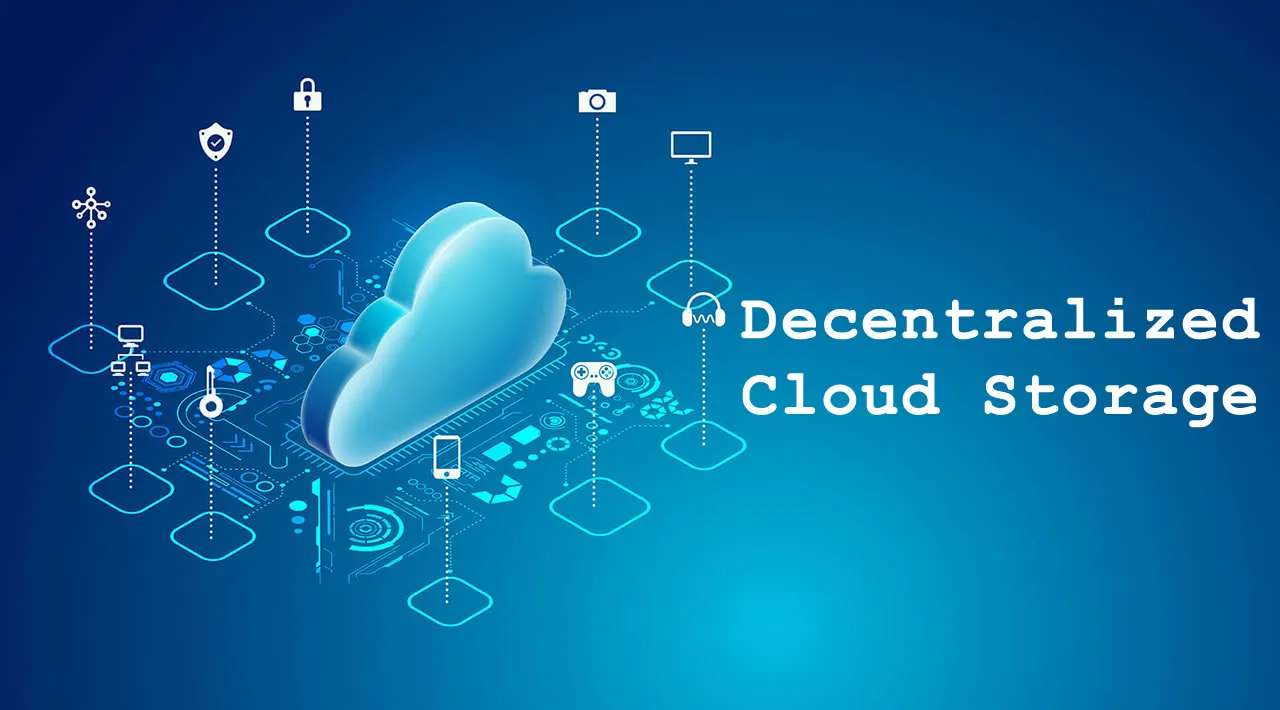Welcome to the forefront of data storage innovation – the future of decentralized cloud storage with DePIN. In a world where data is the lifeblood of every industry, the need for secure, efficient, and resilient storage solutions has never been more critical. DePIN emerges as a beacon of hope in this landscape, offering a decentralized platform that promises to revolutionize how we store and manage data. In this blog, we’ll delve into the exciting world of DePIN, exploring its evolution, advantages, use cases, and future developments. Join us on this journey as we unlock the potential of decentralized cloud storage and pave the way for a more secure and resilient digital future
Understanding Decentralized Cloud Storage
Decentralized cloud storage, a groundbreaking concept reshaping the digital landscape, offers a paradigm shift from traditional centralized storage models. In essence, it redistributes data across a network of nodes rather than relying on a single central server. This decentralized approach enhances security, scalability, and accessibility while minimizing the risk of data breaches and downtime.
To comprehend decentralized cloud storage fully, it’s crucial to grasp its fundamental principles. Unlike centralized systems controlled by a single entity, decentralized storage operates on a peer-to-peer network, where each participant contributes storage capacity and shares resources. This distributed architecture eliminates the vulnerability of single points of failure, making data more resistant to hacking, censorship, and other malicious activities.
Transitioning from traditional cloud storage to a decentralized model requires a shift in mindset. Instead of entrusting data to a single provider, users become part of a decentralized network, retaining full control and ownership of their data. This distributed approach ensures data sovereignty and privacy, empowering users to determine how their information is stored, accessed, and shared.
Furthermore, decentralized cloud storage leverages cryptographic techniques such as encryption and sharding to enhance data security. Encryption algorithms safeguard data by converting it into unreadable ciphertext, ensuring that only authorized users can decrypt and access it. Sharding, on the other hand, involves splitting data into smaller fragments distributed across multiple nodes, further fortifying against unauthorized access and data loss.
In addition to bolstering security, decentralized cloud storage offers unparalleled scalability and cost-efficiency. By harnessing the collective storage capacity of network participants, it can seamlessly scale to accommodate growing volumes of data without incurring exorbitant infrastructure costs. Moreover, the absence of intermediaries reduces overheads and eliminates costly subscription fees, making decentralized storage a cost-effective alternative for businesses and individuals alike.
The Evolution of DePIN
DePIN, short for Decentralized Public Infrastructure Network, represents a revolutionary evolution in cloud storage technology. Since its inception, DePIN has undergone a remarkable journey of growth and innovation, paving the way for a more secure and decentralized approach to data storage.
At its core, DePIN emerged as a response to the limitations and vulnerabilities of centralized cloud storage systems. Recognizing the need for a more resilient and transparent alternative, developers set out to design a decentralized network that prioritizes data security, privacy, and accessibility.
The evolution of DePIN can be traced back to its foundational principles, which emphasize decentralization, encryption, and peer-to-peer networking. By leveraging blockchain technology and cryptographic techniques, DePIN ensures that data remains immutable, tamper-proof, and accessible only to authorized parties.
As DePIN continued to evolve, it embraced interoperability and scalability, enabling seamless integration with existing storage solutions and accommodating the ever-expanding demands of the digital ecosystem. Through the implementation of cross-chain compatibility and sharding mechanisms, DePIN remains adaptable to diverse use cases and environments.
Moreover, the evolution of DePIN is marked by its growing ecosystem of participants, including developers, miners, and users, who collectively contribute to its resilience and sustainability. This vibrant community fosters innovation and collaboration, driving continuous improvements and advancements in DePIN’s functionality and performance.
Unlock the future with SRP Token! Discover the power of decentralized innovation and invest in tomorrow’s technology today
Advantages of DePIN
- Enhanced Security: DePIN employs advanced encryption protocols and decentralized storage architecture, reducing the risk of data breaches and unauthorized access.
- Data Privacy: With DePIN, users retain full control over their data, eliminating the need to rely on third-party intermediaries and safeguarding sensitive information from prying eyes.
- Decentralization: By decentralizing data storage, DePIN eliminates single points of failure and ensures data integrity and availability, even in the face of network disruptions or cyber attacks.
- Immutable Records: DePIN utilizes blockchain technology to create immutable records of data transactions, providing transparency and accountability throughout the storage process.
- Cost-Efficiency: Compared to traditional cloud storage solutions, DePIN offers competitive pricing models and eliminates hidden fees, making it a cost-effective option for businesses and individuals.
Use Cases of DePIN
- Enterprise Data Storage: DePIN caters to the needs of enterprises seeking secure and scalable data storage solutions. Businesses can utilize DePIN to store sensitive data such as customer information, financial records, and intellectual property securely.
- Healthcare Records Management: DePIN offers a reliable platform for managing healthcare records securely. Healthcare providers can store patient data, medical records, and diagnostic reports on DePIN, ensuring privacy and accessibility when needed.
- Supply Chain Management: DePIN facilitates transparent and traceable supply chain management. Companies can store supply chain data such as product information, transaction records, and logistics details on DePIN, enabling stakeholders to track the journey of goods from production to delivery.
- Media and Entertainment: DePIN serves as a robust storage solution for media and entertainment content. Content creators can securely store multimedia files, videos, and digital assets on DePIN, ensuring protection against piracy and unauthorized distribution.
- Decentralized Applications (DApps): DePIN supports the development of decentralized applications (DApps) that require secure and decentralized storage solutions. DApp developers can leverage DePIN’s infrastructure to store application data, user profiles, and transaction records securely.
Future Developments and Trends
As the digital landscape evolves, DePIN is poised to witness further advancements and embrace emerging trends. Here’s a glimpse into the future developments and trends shaping the decentralized cloud storage ecosystem:
- Scalability Enhancements: DePIN will continue to focus on improving scalability to accommodate the growing volume of data generated by businesses and individuals. Scalability enhancements will ensure that DePIN remains capable of handling large-scale data storage requirements efficiently.
- Interoperability with Blockchain Networks: DePIN will explore deeper integration with various blockchain networks to enhance interoperability and facilitate seamless data storage and transfer across different blockchain platforms. This interoperability will enable users to leverage DePIN’s decentralized storage capabilities in conjunction with blockchain-based applications and services.
- Enhanced Security Measures: In response to evolving cybersecurity threats, DePIN will implement advanced security measures to fortify its decentralized storage infrastructure. Enhanced encryption protocols, multi-factor authentication, and cryptographic techniques will be employed to safeguard data stored on DePIN against unauthorized access and breaches.
- Integration with Emerging Technologies: DePIN will explore integration opportunities with emerging technologies such as artificial intelligence (AI), machine learning (ML), and edge computing. Integration with these technologies will enable DePIN to offer advanced data analytics capabilities, real-time processing, and intelligent data management solutions.
- Improved User Experience: DePIN will prioritize enhancing the user experience by developing intuitive interfaces, streamlined workflows, and user-friendly features. These improvements will make it easier for users to store, access, and manage their data on the DePIN platform, thereby driving greater adoption and engagement.
Challenges and Opportunities
Navigating the realm of decentralized cloud storage presents a spectrum of challenges and opportunities. Here’s a closer look at the key challenges and opportunities facing the DePIN ecosystem:
- Security Concerns: One of the foremost challenges in decentralized cloud storage is ensuring robust security measures to protect user data from unauthorized access, breaches, and cyber threats. However, this challenge also presents an opportunity for DePIN to implement advanced encryption techniques, decentralized authentication mechanisms, and secure data storage protocols to enhance security and instill trust among users.
- Scalability Issues: Scaling decentralized storage solutions to accommodate the ever-growing volume of data poses a significant challenge. Nevertheless, this challenge opens up opportunities for DePIN to explore innovative scalability solutions such as sharding, off-chain storage, and distributed data replication to ensure seamless scalability and accommodate the increasing demand for storage capacity.
- Regulatory Compliance: Adhering to regulatory requirements and compliance standards poses challenges for decentralized cloud storage platforms, particularly concerning data privacy, security, and jurisdictional regulations. However, regulatory compliance also presents opportunities for DePIN to proactively engage with regulators, legal experts, and industry stakeholders to develop compliance frameworks, privacy-enhancing technologies, and transparent governance mechanisms that foster regulatory compliance while preserving user privacy and data integrity.
- Adoption and Awareness: Driving adoption and raising awareness about the benefits of decentralized cloud storage among users, enterprises, and developers is crucial for the success of platforms like DePIN. Overcoming barriers to adoption, such as lack of familiarity, misconceptions, and inertia, requires concerted efforts in education, outreach, and user experience improvements. However, this challenge also presents opportunities for DePIN to leverage marketing strategies, community engagement initiatives, and user-centric design principles to increase adoption, foster community growth, and expand market reach.
Conclusion
In conclusion, the journey towards the future of decentralized cloud storage, as exemplified by DePIN, is marked by a myriad of challenges and opportunities. While navigating the complexities of security, scalability, interoperability, regulatory compliance, adoption, innovation, economic viability, global localization, environmental sustainability, and governance, DePIN stands poised to redefine the landscape of data storage. By embracing these challenges as opportunities for growth, innovation, and community empowerment, DePIN paves the way for a decentralized, secure, and sustainable future of cloud storage. As users, enterprises, and developers alike embrace the vision of decentralized cloud storage, DePIN remains committed to driving innovation, fostering collaboration, and shaping the future of data storage for generations to come.

 China
China Russia
Russia India
India









